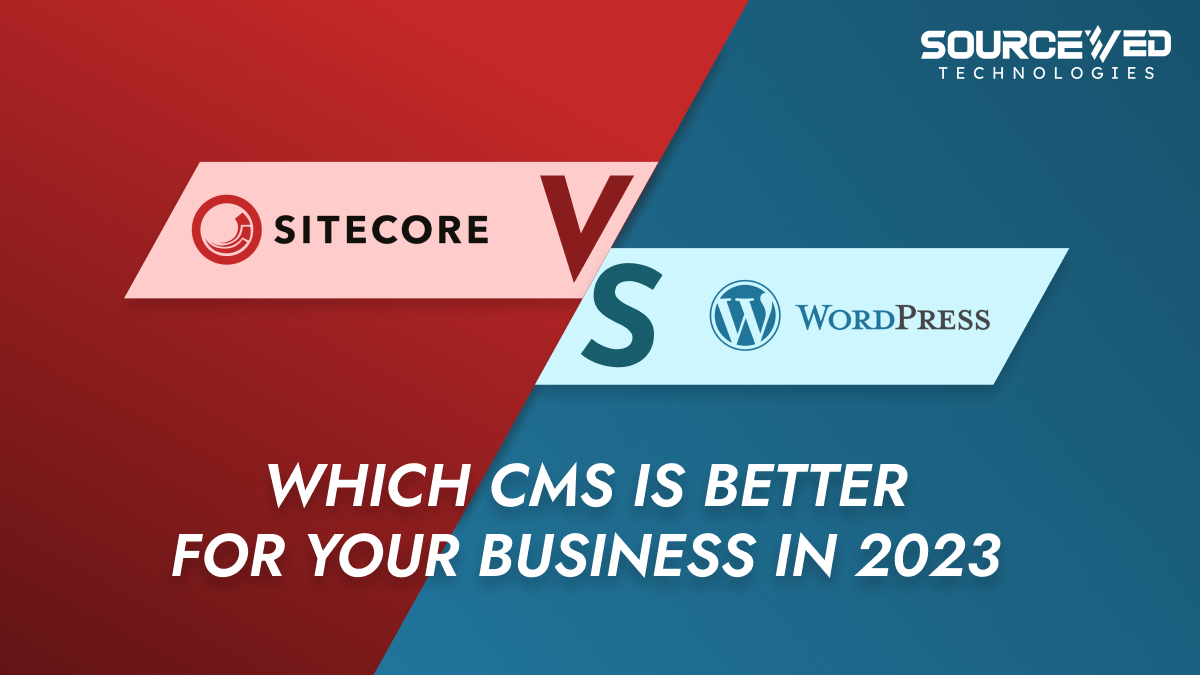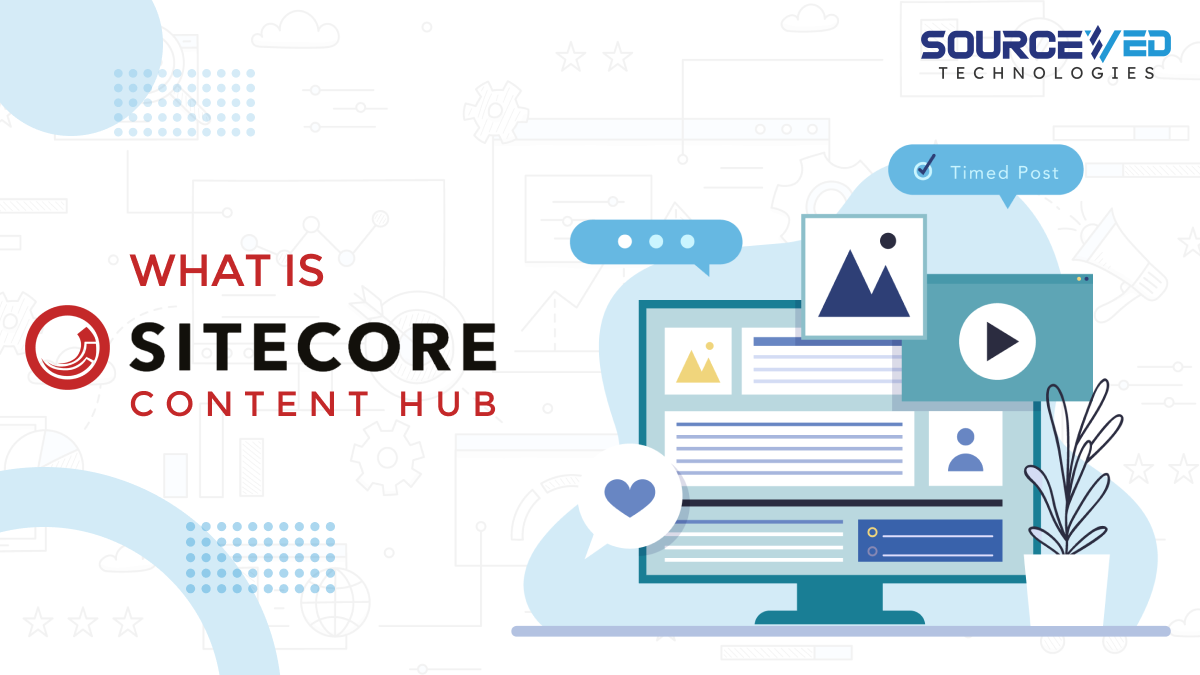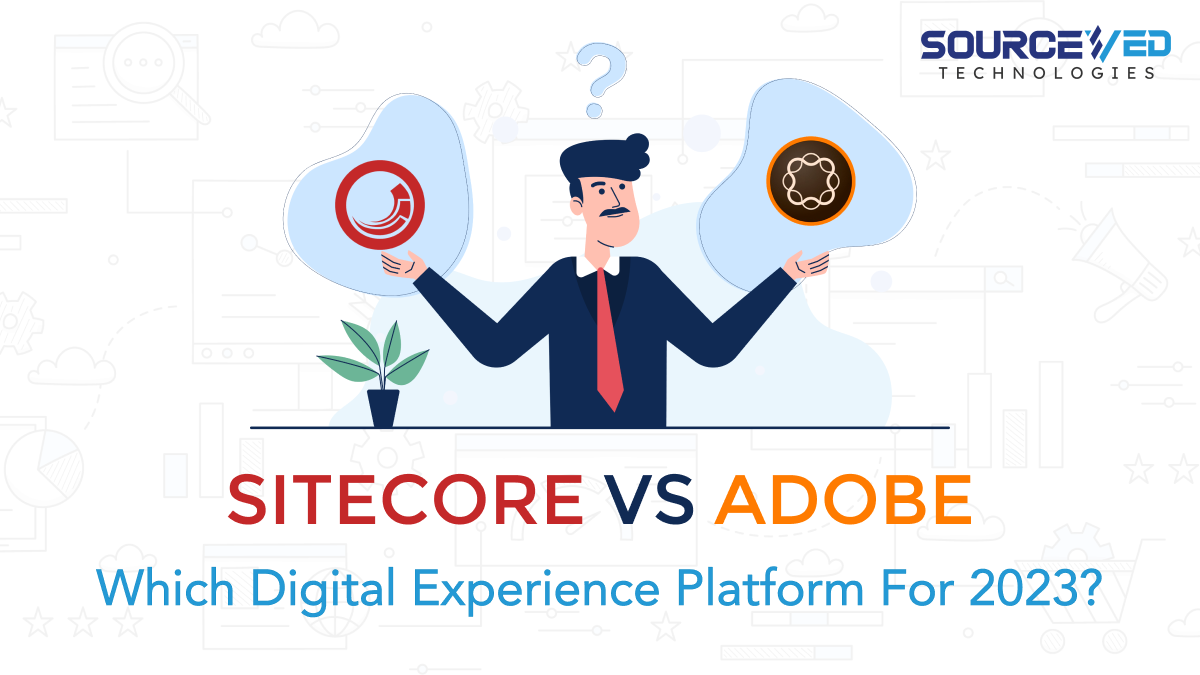In today’s technological era, a company needs to have its website. Businesses may now easily generate, manage, and distribute digital content using a content management system (CMS) with little to no specialized technical skills. However, picking the best content management system (CMS) among the numerous options might take a lot of work.
WordPress vs Sitecore: Overview
Sitecore and WordPress are two common platforms for this purpose. WordPress is a popular open-source CMS with a vast user base, whereas Sitecore is a strong and comprehensive enterprise-level CMS. To assist you in determining which content management system (CMS) is ideal for your organization, we’ll compare and contrast Sitecore vs. WordPress in this blog post.
What is WordPress?
WordPress is a popular, easy-to-use, and open-source software for making websites. WordPress is a PHP program that connects to a MySQL database to store information. WordPress is the most user-friendly and robust platform for creating blogs and websites.
It is an adaptable CMS suitable for a wide range of uses. WordPress is a wonderful option for any size website due to its adaptability and user-friendliness. WordPress is the most well-liked platform for making your website or blog. More than 43 percent of all websites run on WordPress. WordPress runs over one-quarter of the sites you visit daily.
Reasons to use WordPress
Open-source:
WordPress is free software that anybody may use. This allows any user to make changes to the program and republish it. People are encouraged to provide suggestions regarding how the service might be enhanced.
Simple to use:
WordPress may be used by someone without formal training in computer science. It’s designed specifically for those who need to be computer savvy. The UI is both easy and pleasant to use. Installing a new theme on your site will give it a fresh look. Plugins allow you to easily add features to your site, such as a contact form. Previously time-consuming web development activities may now be completed in minutes.
SEO-friendly:
Simply creating a WordPress site is insufficient. Search engine optimization is essential if you want people to visit your website. Search engine optimization (SEO) plugins like Yoast SEO provide meta description templates and internal linking ideas to improve search engine results.
Compatible with any media format:
WordPress does not restrict any of the most common file formats. Your website may include as much or as little text, pictures, and videos as you choose. It’s comforting to know you have room to experiment on the platform in an increasingly crowded market for customers’ attention.
Secure to use:
WordPress is one of the most secure content management systems (CMS) if you update your plugins regularly and use strong passwords. To keep your website secure, the platform provides options like automatic logout for inactive users and support for two-factor authentication.
What is Sitecore?
According to research firms Gartner and Forrester, Sitecore is the best .NET CMS available. However, Sitecore is much more than simply a top-notch content management system. Sitecore allows for the management of content. You can automate sending the most relevant message to the most relevant individual by testing, optimizing, and personalizing your content.
Sitecore also helps your team make sense of and use all your data by connecting, collecting, and analyzing data about your customers’ online and offline interactions.
Some of the many benefits that Sitecore offers businesses are:
1) Personalization:
With Sitecore, companies can use analytics and data to provide consumers with more individualized service. This is useful since it boosts interaction and leads to more sales.
Multichannel support:
Sitecore is a content management system that helps organizations distribute their content on several platforms. In this way, companies may communicate with their customers no matter where they may be.
Scalability:
Sitecore can manage high-traffic, complex websites because of its design. It may be readily expanded or contracted to fit any size company.
Security:
Sitecore was developed with security measures, including user authentication, permission management, and encryption in mind. This aids in defending enterprises from cyber-attacks and maintaining regulatory conformity.
Integration:
Sitecore can integrate with various third-party networks, such as customer relationship management (CRM) software and marketing automation tools. Companies may enhance their marketing efforts and simplify their processes.
Analytics:
Sitecore’s powerful analytics features allow organizations to monitor site traffic, assess audience interest, and fine-tune their content approach.
WordPress vs Sitecore: Detailed Comparison
When selecting a CMS, it is essential to consider your company’s requirements. It would be best to ensure that the features available align with your needs. If they don’t, keep exploring; plenty of products are designed to meet the demands of even the most specific of customers.
Sitecore and WordPress are the most powerful content management systems (CMS) available. But there are significant distinctions between the two.
To start, WordPress is much more widespread than Sitecore. More websites of all types and languages utilize it. Second, WordPress is based on freely available software, whereas Sitecore requires a specific managed platform. In essence, whereas WordPress is free to use (not including the cost of the hosting service you choose to utilize), Sitecore requires a paid license.
Despite these differences, a comparison can still be made between the systems using the four most important CMS characteristics. Let’s utilize these characteristics to consider which one to use.
Ease of use/operation
Sitecore and WordPress offer businesses the fundamental tools for managing content. Users may use their talents in content production, modification, preview, and distribution. While both include a powerful content editor, versioning, and WYSIWYG functionality, populating WordPress’s categories may be challenging and time-consuming.
In its default form, WordPress is a simple CMS that may be enhanced with additional plugins.
E-commerce, search engine optimization, individualization, analytics, email automation, and more all call for specialized plugins. In comparison, businesses using Sitecore can access several pre-built solutions and customize the platform further with additional modules. It also enables content reuse and multi-site deployment, two time- and money-saving features.
Sitecore is a very effective and feature-rich system, but it may be not easy to administer without the right knowledge or a reliable partner. An individual who has reviewed G2 has said, “You certainly can’t apply this yourself. You should work with a buddy. It has a very high barrier to entry in terms of knowing it.
Verdict
WordPress’s general themes, templates, and functions make it an accessible platform for technical and non-technical users. Sitecore was built with big businesses and their unique requirements in mind.
Flexibility and Adaptability
Businesses want a system that allows them to modify existing items to meet their specific requirements. In addition, they must find a way to command the content management system fully. Sitecore’s extensive capabilities and functions enable businesses to set up granular user permissions.
Managers can track changes, audit them, and provide final approval on any updates before going live with this control level. Sitecore is investing in and adopting composability and MACH architecture beyond its CMS capabilities by purchasing and integrating multiple API-first products, including Boxever, Moosend, and Four51. This allows for best-of-breed solutions to be implemented with more adaptability and scalability.
WordPress, on the other hand, is a unified CMS that allows users to customize the interface via various pre-built themes and layouts.
Companies may have difficulty tailoring them to their own needs and preferences. The guidelines may them in businesses lacking the technical workforce. You’ll be compelled to look into third-party plugins, which may add unnecessary complexity and load times if you don’t keep them under control.
In addition, WordPress’s scalability issues might be frustrating. A G2 reviewer writes that the system’s scalability is constrained by its nature, despite its many benefits. It has a wide range of creative potential, but it is difficult for huge enterprises to expand.
Verdict
If you need a bespoke solution and have the in-house expertise and workforce to implement Sitecore. WordPress, however, is ideal for non-trivial problems that can be solved with little technical knowledge.
Security
Security is a must-have feature of any reliable platform, and most businesses agree. Sitecore is a closed-source platform developed on the .NET core, making it more reliable and secure than WordPress and similar open-source alternatives. It’s a one-stop shop whose features have been reviewed and authorized by industry professionals. When compared to WordPress, this makes it a far more secure platform.
WordPress is especially susceptible to hacking and security breaches due to its open-source nature and its dependency on plugins. Not surprisingly, WordPress sites accounted for 90% of all compromised content management systems Sucuri secured in 2018.
Verdict
your business values data privacy and security, Sitecore should be your go-to platform.
Costs
There is more to the tale than that Sitecore is an enterprise solution with a reasonable yearly license charge, and WordPress is an open-source platform available at no cost. Plugins and extensions, which are licensed independently, are necessary to modify and expand WordPress’s capabilities. Additional hosting and theme/template fees may also be necessary. Furthermore, if you want to tailor WordPress to your business’s demands properly, you’ll want to employ skilled developers.
When you purchase Sitecore, you can access its various tools and functionalities. E-commerce, electronic mail advertising, digital asset management, a consumer data platform, and individualized content are just a few examples. Although the platform allows for extensive customization, some of the optional modules come at an additional cost, and implementing such changes might require a substantial financial outlay on the part of businesses. It’s important to remember that hiring an agency to assist with Sitecore’s setup and upkeep may incur additional fees.
Verdict
WordPress is an excellent choice for small companies who need more funds for a professionally developed website. Sitecore is the best option for companies with specific needs and the means to implement them.
Certification and Training
Sitecore’s documentation, blog posts, and video tutorials are just a few free resources available. Furthermore, its paid training programs and certifications are open to developers, marketers, and designers. You must acquire this information and training to realize Sitecore’s full potential. Find out more about the top-rated Sitecore courses.
WordPress users can access a wealth of user-generated material, including blogs, videos, and forums, all available at no cost. There are no recognized training programs that lead to certification, nevertheless.
Verdict
Whether you require certificates may influence your decision in this case.
Ecosystem Partners
Sitecore is a complex system with numerous advanced capabilities that might be challenging to administer without in-depth familiarity with the system. To get the most out of your investment, you’ll need the assistance of certified Sitecore partners, but these professionals are costly. The finest solutions for your business’s unique problems may be identified with the help of a trusted partner.
But WordPress may be used and set up independently of a partner. WordPress is a content management system (CMS) that is both user- and developer-friendly, with a low bar to entry in terms of technical know-how. Because of this, it is the optimal choice for companies with very simple website needs. Expert developers or agencies will be required to tailor the platform to your needs and provide an enterprise-level digital experience.
Verdict
If you’re on a low budget and don’t need a lot of customization, WordPress is the way to go, whereas Sitecore requires the assistance of an external partner firm.
Marketing capabilities
To create a successful digital experience, you need more than just a content management system (CMS). Sitecore is a DXP that helps with e-commerce, search engine optimization, data administration, user experience, site optimization, and automated marketing.
With Sitecore as your CMS, you can use many of these features out of the box but with more work. In addition, it expands the capabilities of its platform by adding API-first, modular solutions that businesses may use on their own or combine with other systems.
Many specialized marketing needs may be met by incorporating third-party plugins into WordPress. Yoast for search engine optimization, WooCommerce for online stores, Jetpack for plugins like forms, and Google Analytics for site analysis are just a few examples of how WordPress may be used. It would help if you gained the technical know-how to handle many of these plugins to avoid security issues, slow performance, and even site outages.
Verdict
Sitecore is a more robust platform for your website and digital marketing needs than WordPress. It has everything you need to handle your marketing without sacrificing your site’s speed or security.
Choosing the Best Content Management System: Sitecore or WordPress
When comparing Sitecore vs. WordPress, keeping the end user in mind is important. WordPress is a great platform for establishing a website fast, with little effort and cost. However, there may be constraints in the future, particularly if you have unique needs.
Sitecore is an effective business platform for high-volume, customer-focused websites. It has various reliable tools for creating a solid foundation for digital experiences. Partnering with a Sitecore expert may help maximize your investment by guiding you toward the most effective Sitecore features.
Do you need professional help in choosing the right CMS for your business? Sourceved is the leading Sitecore development company in India. Our expert Sitecore consultants can help you choose the right CMS based on your business requirements. Reach out to us to book a free consultation.
FAQs
1. Which kind of businesses would benefit most from using Sitecore or WordPress?
Sitecore is a good fit for major corporations with the cash to spend producing the greatest digital experiences for their websites and the brand-specific demands to do so. WordPress’s versatility makes it a good option for many businesses, especially those that don’t have complex or specific requirements.
2. What are the underlying technologies that Sitecore and WordPress use?
Sitecore is an ASP.NET-based platform designed for large-scale use. WordPress, on the other hand, is created using PHP and MySQL.
3. What sets Sitecore different from WordPress?
WordPress is a classic CMS accessible to technical and non-technical users, whereas Sitecore is an enterprise CMS designed to meet the needs of large organizations. Additionally, it’s a frontrunner when adopting MACH architecture and composability, two features WordPress lacks.








Leave A Comment